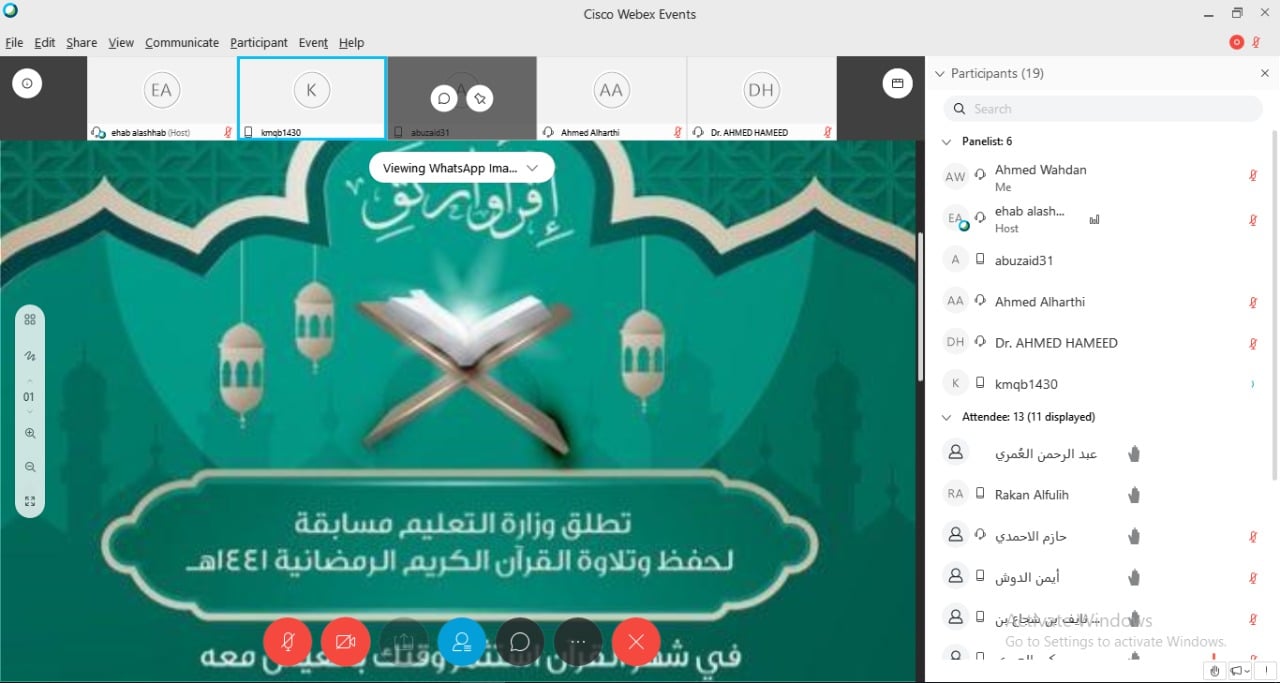
The Jury Committee, consisting of 63 male and female judges, from Umm Al-Qura University continues the remote sessions of the "Read and Rise" competition for the Holy Qur'an memorization and recitation, for the fourth consecutive day. This competition has been launched by the Ministry of Education, being part of its summer activities for general education students in all its stages throughout the Kingdom of Saudi Arabia, in cooperation with Umm Al-Qura University, represented by the Department of Qur'anic Recitations at the College of Da`wah and Fundamentals of Religion and the Deanship of E-Learning and Distance Education. The competition sessions will take place during the period from 15 to 21 Ramadan, 1441 A.H.
The aim of the competition is to encourage students to compete in studying Allah’s Book during the holy month of Ramadan and to invest their time in useful activities during the period of preventive home quarantine, supporting the campaign: #Stay_Home to limit the spread of the Novel Coronavirus.
The Vice Dean of the Deanship of E-Learning and Distance Education for Development and Entrepreneurship and supervisor of the competition, Dr. Ahmad Humaid, explained that the deanship uses the WebEx system, originally used for holding university councils, scientific discussions, and the "Electronic Maqraah", to conduct the competition and judge the competitors. Lists of 21 thousand registered students from 47 education departments in the kingdom and their data were distributed over 56 hearing sessions, covering a period of seven days. Eight sessions are held per day, each session being divided into two periods: one for male students and another for female students, to compete in the two categories of the competition which includes 7 branches: 5 five branches for Qur’an memorization, and two branches for Qur'anc recitation and Tajweed.
The supervisor of the competition indicated that the Department of Student Activity at the ministry has established a quick mechanism for evaluating students and showing results with high accuracy via the electronic "Qayyim" platform. This facilitated the workflow of the jury in approving the scores once the evaluation session, consisting of two judges and the technical support supervisor, was completed. He stressed the importance of cooperation between the Ministry of Education and the universities in the use of the available technologies, investing all the beneficial knowledge and scientific expertise in serving the Holy Book of Allah as well as initiating programs that serve the different segments of society in the kingdom.
On his part, the Head of the Department of Qur'anic Recitations at the College of Da`wah and Fundamentals of Religion and supervisor of the jury of the competition, Dr. Ahmad Al-Huraisi, confirmed the readiness of the judges to deal with the many levels of education and the diversity of age groups in this stage compared to the undergraduate level, taking them as important indicators for assessment and final score calculation. The number of members of the jury and hearing reached 63 male and female judges of faculty members, all of whom are licensed teachers of Qur'an recitations.
Moreover, Dr. Ahmad Al-Huraisi explained that the judging mechanism is based on a methodology that is subject to special criteria and relies on special forms for each branch of the competition. This includes questions to test memorization, recitation, exegesis of verses, and meanings of words. The number of questions varies according to the sections of the Qur’an set for each branch. On the basis of these questions, scores will be calculated and recorded on the platform. He further explained that the ministry has allocated 6 winners from the male and female students in each branch, to be chosen according to specific controls. In the event that the competitors' scores are equal, their answers will be re-evaluated and the audio recordings will be heard again by the supreme jury to decide between them and choose a winner accordingly.